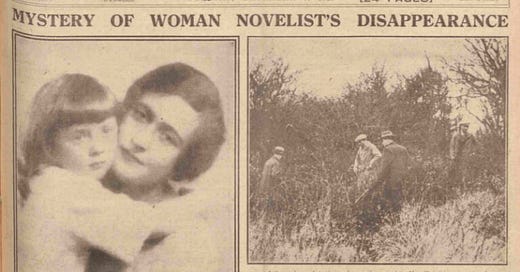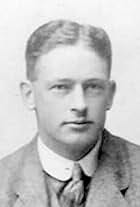Hello, readers.
The summer is almost upon us, but before you take a well-planned vacation to a predetermined destination, I ask you to consider a quick getaway in the style of Dame Christie, complete with scandalous spontaneity, a touch of non compos mentis, and all the drama that you can muster.
Need more details so you can properly disappear into the night and cause a huge stir among your friends and family? No problem.
On Friday, December 3rd of 1926, Agatha Christie (already a literary sensation in the crime fiction world—earlier that year she had published The Murder of Roger Ackroyd) got into her car and just peaced out of Sunningdale without telling anyone where she was going.
It was a big to-do in the tabloids and took over the headlines in England for a few weeks. Over the next few days, a full manhunt was launched with search parties and dogs sniffing around quarries. Sir Arthur Conan Doyle even consulted a medium. A lake was dredged. Needless to say it was very messy and probably a huge embarrassment for her twat of a husband at the time, Archibald.
But don’t feel bad for him. Dude was two-timing Agatha with his secretary (classic!) and when he asked her for a divorce, she may or may not have decided she was going to blow up his spot in the most melodramatic way possible.
The best part about all of this? Christie shrugged off the whole episode and chalked it up to temporary memory loss, claiming to have no recollection of the events.
Girl, get it.
Here is a better synopsis from The National Archives as to how it went down:
“Following an argument between husband and wife on 3 December, Archie left to spend the weekend with friends. Later that night Agatha kissed her daughter Rosalind goodnight as she lay sleeping, left the house and drove away in her Morris Cowley. The next day, the car was discovered abandoned above a chalk quarry at Newlands Corner, and some of her clothes were found inside.”
The official police report about the disappearance did little to downplay the situation. Within it, they editorialized that the car was found in a way that might indicate “some unusual proceeding had taken place” and that “it had got out of control.” Perhaps the cop writing the report should have just stuck to the facts? It didn’t help that an eyewitness claimed to see her the night of the disappearance “sparsely dressed” and “strange in her manner.”
Of course everyone assumed the worst and a full-blown investigation was launched to find one of England’s most popular writers. It was such a sensation that even members of the public joined in the search. What fun. Imagine if Gillian Flynn disappeared and you could take part in the search. Why just read Gone Girl when you can be part of the action?
This went on for eleven days. The story took over much of the news cycle and the papers went ham on speculation, unverified rumors, and gossip. Smear pieces and yellow journalism tried to tear her to bits without knowing the actual facts of what had happened to her. I don’t know if this is where British papers originally cut their teeth for sensationalism, but they certainly sharpened their taste for a scandal.

A bunch of newspapers ran article after article attempting to surmise what became of her—she drowned herself, she was murdered by her husband, she was murdered but it was made to look like an accident, it was a publicity stunt to sell more books, she was crazy and jealous—anything to sell a paper.
It became such a hullabaloo that even Sir Arthur Conan Doyle, a spiritualist obsessed with seances and the occult, even consulted a medium to help find her. Doyle was able to procure one of Christie’s gloves and gave it to the clairvoyant. After examining it, the medium indicated that she would be found near a body of water. So a lake near where the car was found was dredged, obviously. But no body. Hmm…
So what did happen?
Well, she was eventually found.
No, what happened.
She was found on December 14 at the Swan Hydro hotel (Conan Doyle’s medium was sort of right!) in Harrogate, 221 miles away. Another guest recognized her and called the authorities. She had checked in—here’s the best part—under the name of her husband’s mistress, Mrs. Tressa Neele. Don’t tell me that wasn’t a shot aimed, fired, and hit.
No, what actually happened?
Oh, well there are a few theories. Some say it was a publicity stunt. Others say she truly lost her mind and suffered from amnesia. Others say that she was just looking for attention. Nobody knows. When asked, Archibald claimed that “she was suffering from a nervous disorder.” The author herself was able to go with the memory loss excuse until the day she died.
According to Chrisitie:
All that night I drove aimlessly about. … In my mind there was the vague idea of ending everything. I drove automatically down roads I knew … to Maidenhead, where I looked at the river. I thought about jumping in, but realized that I could swim too well to drown … then back to London again, and then on to Sunningdale. From there I went to Newlands Corner.”
“When I reached a point in the road which I thought was near the quarry I had seen in the afternoon, I turned the car off the road down the hill towards it. I left the wheel and let the car run. The car struck something with a jerk and pulled up suddenly. I was flung against the steering wheel and my head hit something.”
I like to believe it was deliberate and that she knew full well what she was doing: her disappearance was a big fuck you to her rat of a husband, causing him all the distress and embarrassment of a big scandal.
Lucy Worsley has another theory. In fact, she claims to know what really happened.
I first learned and became obsessed about the Agatha Christie disappearance in Worsley’s book, Agatha Christie: A Very Elusive Woman. Worsley is a historian who used to be Chief Curator at Historic Royal Palaces. She writes historical biographies, and none better than the aforementioned Christie one. In fact, I would call it the definitive Christie biography.
So according to her, the disappearance was a result of a combination of two factors—her mother’s death and her husband’s infidelity. After contemplating suicide and the reality that would entail, Christie entered what is called a “fugue” state. This means that recent events in her life were so traumatic that she suffered from a dissociative condition where individuals may experience amnesia and travel to unfamiliar locations.
That is the story that Worsley is sticking to, and her medical explanation is very convincing. The science just wasn’t there in Christie’s time. Because this psychiatric condition was not named until 1980, many people wrote Christie off as an attention-whore, a liar, or a faker.
Worsley continues to defend Christie, whose reputation is still somewhat damaged by the whole episode. “The narrative is that she was somehow a bad person who was playing some sort of trick on the world; to frame her husband or get attention to sell novels,” said Worsley. “That’s not framing your cheating husband for murder, that is living with a really serious mental health condition.”
Whatever the cause of her breakdown, it still sounds like Agatha had a cracker of a good time. About her time at the Harrogate spa, she said she was “very happy and contented.” While there, she treated it like a vacation. She visited the Turkish baths and attended several dances and social events. While shopping, she bought herself a new hat, evening shoes, and books and magazines. She also visited the Harrogate library.
Whatever her mental state, this is the definition of “me time.”
The best part? She could do it all with her own money.
Did her marriage ever recover? After returning home, her husband followed through with the divorce and went on to marry his mistress, the real Ms. Neele. A few years later, Agatha met her second husband, Max Mallowan, and they were married for over 40 years until his death.
As for Agatha’s career, she continued to write and publish. Seven years later when she put out the massive hit Murder on the Orient Express. She went on to publish over 60 more novels and numerous short stories. She is still today the best-selling novelist of all time, having sold over a billion copies of her books in the English language.
In 1977 while writing her autobiography, she addressed her controversial disappearance in a few short lines: “So, after illness, came sorrow, despair and heartbreak. There is no need to dwell on it.”
I’d say she’s good.
Now please find a good spot for your own little 11-day vacay.





